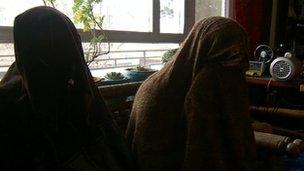Afghan women fear losing safe houses
- Published

Safe houses have offered women protection until now
The Afghan government is to take control of the country's 11 women's shelters - currently mostly run by international charities. The Ministry of Women's Affairs has accused international donors of corruption and said aid money is not being properly spent. Human rights organisations warn the changes could put women at risk, as Quentin Sommerville reports from Kabul.
Inside a women's shelter in Kabul, the women are working to rebuild their lives. At a sewing machine, they learn handicrafts, and other skills - but mostly this safe house offers them protection.
The location is secret because for some of these women their lives depend on the fact that their families don't know where they're being kept.
In a corner, her hands fidgeting nervously, and her small son by her side, a woman we'll call Mariam tells me her story.
"My husband was beating me all the time, he was a former Taliban commander, and very violent," she says.
"He tried to force me into prostitution. I have two of my children here with me, my oldest boy is with my husband - he took him by force."
'Drug dens and brothels'
Many of the women have been through horrible abuse. The safe house offers them and their children sanctuary.
But in this conservative Muslim society there is an innate suspicion of the shelters.
Some Afghan politicians have said that they are drug dens, others have alleged they are being used as brothels.
The shelter's manager, who won't giver her name, denied the claim.
"It is good that you've seen this shelter for yourself," she says. "No woman leaves this house illiterate; we put pressure on them to get educated here and stand on their own feet.
"We've had women who were addicts when they came here, and we treated them and reintegrated them back to normal life."
'Government will protect women'
In the shelter's classroom, a handful of women gather to learn to write. There is plenty of encouragement as a woman writes her name for the first time.
The women say the shelter is well run and they are well occupied.
But this shelter, and the 10 others across the country, will soon fall under direct government control. Human rights groups worry that their secrecy will be compromised.
The police force - mistrusted by many - will be given the job of shelter security. That could be enough to deter women from entering the safe-houses.
At a news conference Dr Hussan Ghazanfar, the minister for women's affairs, accused the international community of spending millions on only a handful of women.
"I think they are more concerned about money than the women who live in their shelters," she said. "If they were really worried about women, why aren't they helping the thousands outside the shelters who experience violence every day?
"The government will protect the women in the shelters. We will take time to review every case fairly - and we won't force women to return to their homes."
The government's critics say it is bowing to conservative pressure.
But for now those running the shelters say they will try to work within the new rules and that they will continue to fight to protect the country's women, and give them a voice.